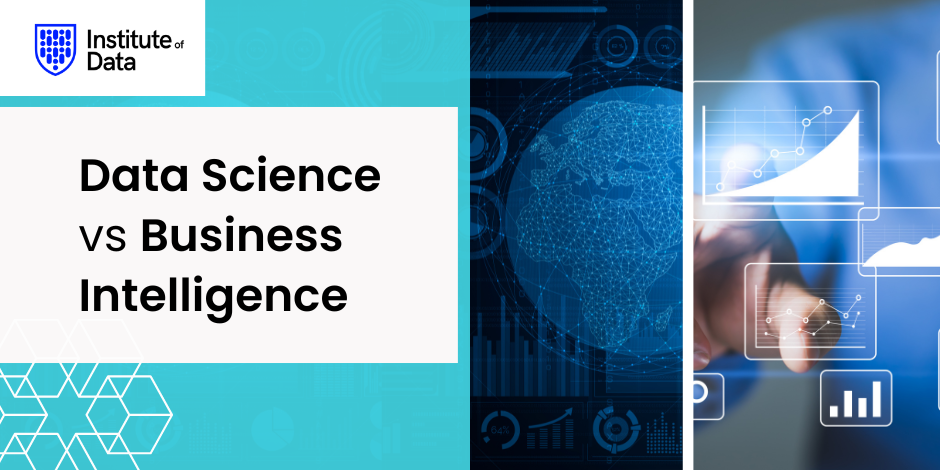The Impact of Data Science and Business Intelligence on Modern Businesses

Stay Informed With Our Weekly Newsletter
Receive crucial updates on the ever-evolving landscape of technology and innovation.
Data science and business intelligence have revolutionised the way modern enterprises operate.
With the exponential growth of data available and advanced analytics tools, organisations now have the power to uncover valuable insights and make informed decisions to stay ahead in the competitive business landscape.
This article will explore the significant impact data science and business intelligence have on enterprises and how they can be leveraged for success.
Understanding data science and business intelligence

Data science, in a business context, involves extracting knowledge and insights from large datasets to solve complex problems and make data-driven decisions.
It combines various disciplines, including statistics, mathematics, and computer science, to analyse vast amounts of data and derive actionable insights.
On the other hand, business intelligence refers to the strategies, tools, and technologies that organisations use to collect, analyse and present business information.
The goal of business intelligence is to facilitate informed decision-making and improve the overall performance and efficiency of a company.
Defining data science in a business context
Data science plays a crucial role in transforming raw data into meaningful insights. It involves the exploration, cleaning, organisation, and analysis of large datasets to uncover patterns, trends, and correlations.
By leveraging advanced techniques such as machine learning and predictive analytics, data scientists can provide valuable insights that drive business growth and enhance operational efficiency.
Moreover, data science enables businesses to make accurate forecasts and predictions, understand customer behaviour, and identify new opportunities for innovation and revenue generation.
It serves as a foundation for evidence-based decision-making, enabling organisations to stay agile and adapt to the ever-changing market dynamics.
The role of business intelligence in enterprises
Business intelligence systems, comprising data collection, analysis, and reporting tools, are essential for enterprises to gain insights into their operations, customer behaviour, and market trends.
By aggregating data from various sources, including internal systems and external databases, business intelligence empowers organisations to monitor key performance indicators, track progress, and make informed decisions.
Business intelligence tools provide visualisations, dashboards, and reports that enable stakeholders at all levels of the organisation to access and interpret data easily.
This accessibility to information fosters transparency and collaboration, enhancing communication and alignment across departments.
The convergence of data science and business intelligence
Data science and business intelligence are not mutually exclusive; rather, they complement each other in driving business success.
The integration of these two disciplines can unlock the full potential of data, enabling organisations to gain a competitive edge in the market.
How data science and business intelligence interact
Data science employs advanced analytics techniques to uncover patterns, detect anomalies, and predict future outcomes. By leveraging machine learning algorithms and statistical models, data science can identify valuable insights from vast amounts of data unattainable by traditional analysis methods.
These insights are then integrated into the business intelligence systems, enabling users to access and visualise the findings.
The combination of data science and business intelligence empowers decision-makers with actionable insights in a format that is easily comprehensible and actionable.
The benefits of integrating data science and business intelligence
The convergence of data science and business intelligence offers numerous benefits for modern enterprises.
Firstly, it enables organisations to uncover hidden patterns and correlations in data, providing a deeper understanding of business operations and customer behaviour.
Secondly, the integration of data science and business intelligence facilitates proactive decision-making. By leveraging predictive analytics and real-time insights, organisations can identify emerging trends, anticipate customer needs, and optimise business processes.
Lastly, the combination of data science and business intelligence empowers organisations to make data-driven decisions with confidence, reducing uncertainty and mitigating risks.
By incorporating data-based insights into strategic planning and operational processes, enterprises can enhance their overall performance and gain a competitive advantage.
The influence of data science on business decision-making

Data science has transformed the decision-making process in modern enterprises. Traditionally, decision-making relied on intuition and experience, often leading to suboptimal outcomes.
However, with the advent of data science, decision-makers can now rely on evidence-based insights to drive strategic initiatives and operational processes.
The role of predictive analytics in decision-making
Predictive analytics, a branch of data science, enables enterprises to make accurate forecasts and predictions based on historical data and statistical models.
By analysing patterns and trends, predictive analytics can anticipate future outcomes and provide decision-makers with actionable insights.
For example, in the retail industry, predictive analytics can forecast customer demand, optimise inventory levels, and personalise marketing campaigns.
By leveraging these insights, organisations can minimise stockouts, maximise revenue, and deliver personalised experiences to their customers.
Data-driven strategies for business growth
Data science provides enterprises with the tools and methodologies to formulate data-driven strategies for business growth.
By analysing internal and external data, organisations can identify areas of improvement, uncover market opportunities, and optimise resource allocation.
For instance, by analysing customer data, organisations can identify segments with high growth potential, personalise offerings, and tailor marketing strategies.
This data-driven approach enables businesses to allocate resources effectively, reduce costs, and maximise revenue.
Business intelligence as a tool for competitive advantage
Business intelligence is a critical component for organisations seeking a competitive advantage in today’s fast-paced business environment.
By leveraging business intelligence, enterprises can gain insights into their operations, competitors, and market trends, enabling them to make informed decisions and stay ahead of the competition.
Enhancing business operations with business intelligence
Business intelligence provides organisations with real-time visibility into their operations, enabling them to identify bottlenecks, inefficiencies, and areas of improvement.
By centralising data and providing interactive dashboards and reports, business intelligence tools empower enterprises to monitor performance metrics, track progress, and implement data-driven strategies for process improvement.
By identifying inefficiencies, organisations can streamline operations, reduce costs, and enhance overall productivity.
This increased operational efficiency contributes to improving customer satisfaction, increasing profitability, and gaining a competitive advantage in the market.
Business intelligence in customer relationship management
Customer relationship management is a vital aspect of business success.
Business intelligence can provide valuable insights into customer behaviour, preferences, and satisfaction levels, enabling organisations to deliver personalised experiences and build long-term customer relationships.
By analysing customer data and feedback, enterprises can identify patterns, preferences, and pain points in their customer journey.
These insights allow organisations to tailor their offerings, refine marketing strategies, and provide exceptional customer service.
Challenges in implementing data science and business intelligence

While the benefits of data science and business intelligence are undeniable, there are several challenges that organisations face when implementing these technologies and practices.
Overcoming data privacy and security concerns
Data privacy and security are major concerns when dealing with large volumes of sensitive information.
Organisations must ensure that data science and business intelligence systems are compliant with privacy regulations and protected from unauthorised access.
By implementing robust data governance frameworks, organisations can mitigate these risks and maintain the privacy and security of sensitive data.
Additionally, employing encryption techniques and access controls can safeguard data from internal and external threats.
Addressing the skills gap in data science and business intelligence
Data science and business intelligence require a diverse skill set, including expertise in statistics, programming, and data analysis. However, the demand for skilled professionals in this field often exceeds the supply, creating a skills gap.
Organisations can address this challenge by investing in training programs and upskilling existing employees.
By equipping employees with the necessary skills and knowledge, organisations can harness the full potential of data science and business intelligence.
Conclusion
Data science and business intelligence have redefined how modern enterprises operate. By leveraging the power of data and advanced analytics, organisations can make informed decisions, improve operational efficiency, and gain a competitive advantage in the market.
However, to fully realise the benefits of data science and business intelligence, organisations must address challenges such as data privacy and security concerns and the skills gap.
By overcoming these challenges and embracing data-driven practices, enterprises can unlock the full potential of data and position themselves for success in today’s data-driven world.
Want to learn more about data science? Download a copy of the Institute of Data’s comprehensive Data Science & AI program outline for free.
Alternatively, we invite you to schedule a complimentary career consultation with a member of our team to discuss the program in more detail.




